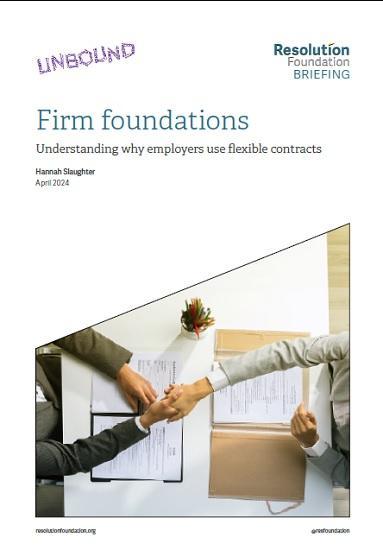Firm Foundations - Understanding Why Employers Use Flexible Contracts
25th April 2024

At the end of 2023, more than one-in-eight (13 per cent) employees in UK were working on some form of flexible contract that can be viewed as ‘precarious', accounting for 3.8 million workers nationwide.
From variable-hours and zero-hours contracts to temporary work such as casual, seasonal or short-term employment, flexible contracts often entail considerable uncertainty for workers over hours or the length of employment, and a fluctuating income too.
And while some workers undoubtedly enjoy the flexibility these contract types offer, for many, they come with real costs, impacting living standards, work-life balance and even health.
Although there is a growing body of research on the impact of flexible contracts on workers, there is far less understanding about what drives employers to hire staff on such terms. In this briefing note - the first in a two-year research programme on precarious work, supported by Unbound Philanthropy - we seek to redress this by drawing on a survey of more than 750 employers fielded in April 2024 exploring why they use flexible contracts, and what might reduce their reliance on such contracts in the years to come.
Key findings
We find that the majority of employers - 75 per cent, equivalent to 1.7 million firms – used some form of flexible contract at some point in 2023.
Whether we look at variable- or zero-hours contracts or various forms of short-term temporary employment, the median employer used that contract type for less than 10 per cent of their workforce.
However, there is a substantial share of employers (one-half, 53 per cent) for whom any form of flexible contract accounts for at least one-quarter of their workforce (a group we term ‘high-use' firms), suggesting flexible contracts are a foundational part of their business model.
One-third (32 per cent) of employers who use flexible contracts say that their staff prefer these types of working arrangements; this share is higher among ‘high-use' firms, at 36 per cent, compared to 27 per cent among ‘low-use’ firms.
The most common factor driving use of these contracts was demand variability. Fluctuating demand for firms’ product or services were cited by half (51 per cent) of firms using flexible arrangements, and one-quarter (24 per cent) reported this was the most important reason (that rose to one-third (32 per cent) for ‘low-use’ firms).
One-quarter (25 per cent) of employers using flexible arrangements report that doing so allows them to reduce their wage bill directly; 13 per cent say it enables them to lower their responsibilities with respect to auto-enrolment and employer NICs; and a similar share report they use such contracts to offset a higher minimum wage.
Among employers currently using some type of these working arrangements, close to one-half (48 per cent) say that they plan to increase the share of their workforce on variable-hours contracts over the next five years, compared to just 14 per cent who say they plan to decrease their use.
Close to two-thirds (63 per cent) of firms would change their behaviour if legislation gave workers a right to a fixed-hours contract or two weeks’ notice of their shifts; almost half (48 per cent) said they would consider reducing their use of flexible contracts if the economic outlook became less uncertain; and more than one-third (37 per cent) would do so if their staff no longer wanted to be employed on them.
Read the full report HERE
Pdf 31 Pages.
